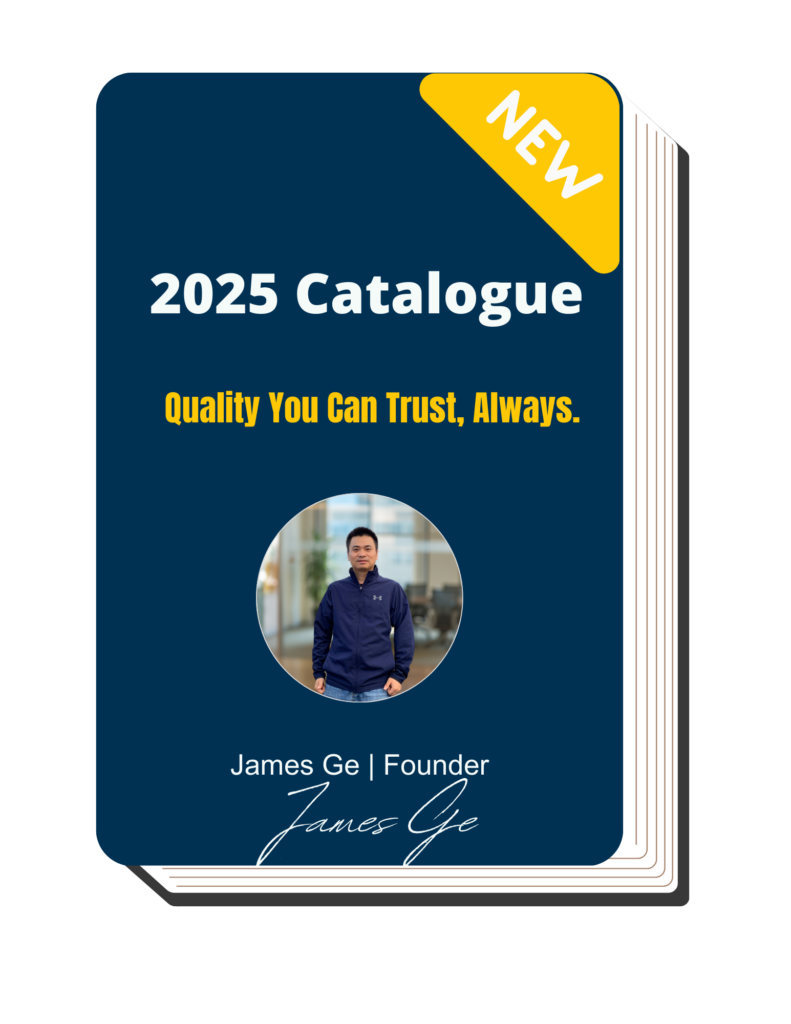I used to believe most trailers were built the same. That belief didn’t last long.
The first time a weld split mid-haul, I knew I’d messed up. It wasn’t just frustrating—it was expensive. And preventable.
Since then, I’ve made it a point to work only with equipment trailer manufacturers that prove themselves in real-world use.
I’ve talked to operators, shop owners, contractors, and even solo drivers who rely on their trailer day in, day out.
If you’ve ever felt unsure about which manufacturer to go with—or worried you’ll buy the wrong one—this article is for you. No guesswork. No fluff.
Here’s what you’ll get inside:
- A list of the top 8 equipment trailer manufacturers
- What each suppliers does well—and what kind of work they’re best for
- Quick points on build quality, load types, and reliability
- Real-world takeaways, not marketing fluff
By the end of this article, you’ll know which equipment trailer manufacturer to trust, what they’re best used for, and how to make a smart buying choice.
Let’s jump in!
Comparison Chart
Before we break each manufacturer down in detail, here’s a snapshot comparison to help you spot the key differences quickly.
| Manufacturer | Founded | Location | Product Focus | Known For |
| Manac | 1966 | Quebec, Canada | Flatbeds, dump, lowbeds, grain, logging | Galvanized parts, modular design, durability |
| Utility Trailer | 1914 | California, USA | Dry vans, reefers, flatbeds, curtainsiders | Long-standing reputation, strong support network |
| Rhinotrail | 2014 | Quanpu Town Industrial Park, Liangshan County, Jining City, Shandong Province, China | Custom-built trailers for construction, logistics, mining | Heavy-duty builds, affordable customization |
| Great Dane | 1900 | Illinois, USA | Dry vans, reefers, flatbeds, platforms | FleetPulse telematics, strong build |
| Wabash | 1985 | Indiana, USA | Reefers, flatbeds, combo trailers | Composite materials, fuel-saving tech |
| Fontaine | 1940 | Alabama, USA | Lightweight flatbeds, lowbeds, combo trailers | Lightweight builds, Stir-Lite tech |
| Doepker | 1948 | Saskatchewan, Canada | Grain, super B-trains, logging, oilfield | Built for Canadian terrain, reliability |
| Stoughton | 1961 | Wisconsin, USA | Dry vans, grain trailers, chassis | Auto Connect system, robotic welding |
Let’s get into the details now—what really makes each of these manufacturers worth considering.
1. Manac
Founded in 1966 by Marcel Dutil in Saint-Georges, Quebec, Manac started in a small barn behind his house.
Over the years, it grew into Canada’s largest and most diverse trailer manufacturer. Today, Manac supports key industries like construction, mining, energy, and farming with strong and reliable trailers.
They build more than just trailers—they build trust with users who depend on their gear daily.
If you haul for a living, you’ve probably seen or used a Manac trailer before. I have too. And they’ve held up better than many others I’ve tried.
Product Range
Manac’s extensive product lineup includes:
- Flatbeds: Ideal for transporting large or oversized items that don’t require enclosure.
- Dry Vans: Enclosed trailers suitable for protecting goods from the elements.
- Dump Trailers: Designed for transporting and unloading bulk materials like sand or gravel.
- Lowbeds: Used for carrying heavy equipment, offering a lower deck height for taller loads.
- Logging Trailers: Specifically built for transporting logs safely and efficiently.
- Grain Hoppers: Trailers with hoppers for easy unloading of grain and similar materials.
Technological Innovations
Manac doesn’t just build trailers—they improve how they work, last, and perform. Over the years, they’ve added smart features that help drivers and fleet owners work smarter, not harder.
Here are a few innovations worth noting:
- Galvanized Steel Components: Parts like crossmembers and slider rails are galvanized to fight corrosion—especially in harsh weather or winter road conditions.
- Manac Air Ride Suspension Options: Helps reduce load stress and gives a smoother haul. Great if you’re moving delicate or high-value cargo.
- Lightweight Composite Materials: Used in some trailer models to reduce overall trailer weight—so you can carry more without going over legal weight limits.
- LED Lighting Systems: Energy-saving lights that last longer and give better visibility, even in poor conditions.
- Modular Design: Some trailers are built with parts that can be easily swapped out, cutting down on downtime and repair costs.
Contact Information
For more details or inquiries:
- Address: 2275 107e Rue, Saint-Georges, Quebec, G5Y 8G6, Canada
- Phone: +1 (800) 361-7900
Key Takeaways
Manac is a smart choice for businesses needing dependable, heavy-duty trailers that hold up under pressure. Their use of galvanized parts, modular builds, and air ride options shows a strong focus on real-world performance and long-term value.
However, while Manac shines in durability and safety, their trailers might not offer the sleek aesthetics or advanced telematics found in some European or high-tech brands. But if you care more about strength, safety, and getting the job done—Manac delivers exactly that.
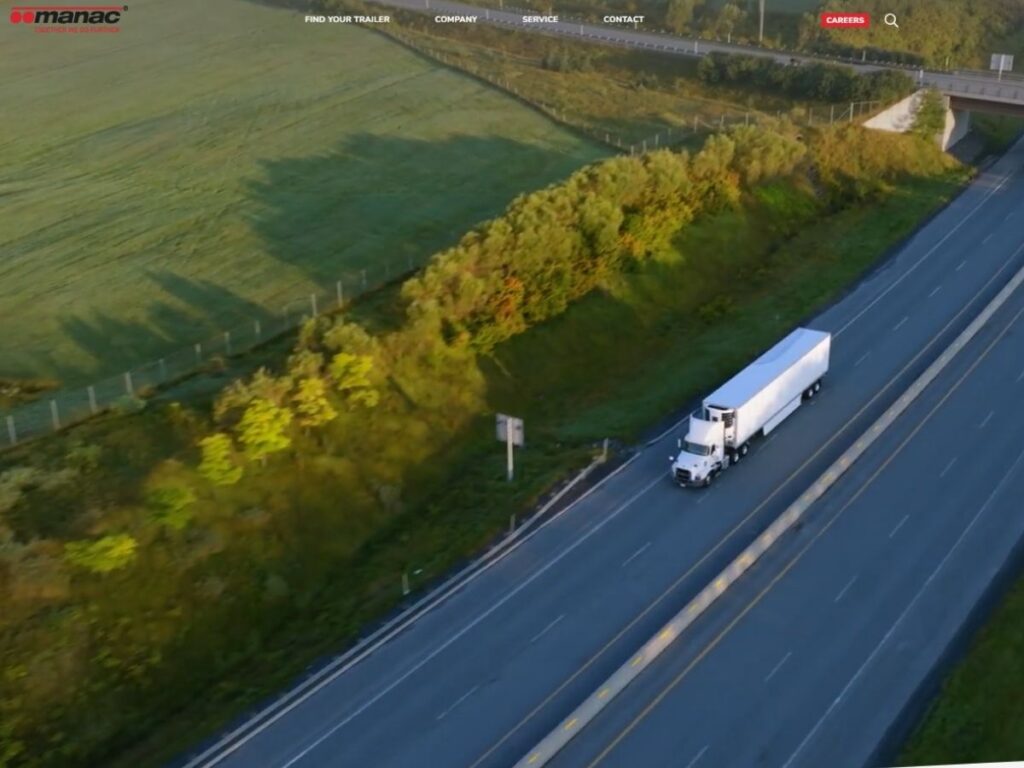
2. Utility Trailer
I’ve always respected businesses that stand the test of time. Utility Trailer is one of those names you hear over and over—and for good reason.
Founded way back in 1914 by two brothers in Los Angeles, Utility Trailer has grown from a small operation into one of the most respected trailer manufacturers in the U.S. They’re still family-owned today, which is rare in this space. To me, that says a lot about their values and consistency.
Product Range
Utility Trailer offers a diverse lineup to fit real-world hauling needs:
- Dry Freight Vans: Protect cargo from the elements
- Refrigerated Vans (Reefers): Control temperature for perishable goods
- Flatbeds: Haul oversized or irregular loads without walls
- Curtainsided Trailers (Tautliners®): Easy side loading with curtain-style access
Technological Innovations
Here’s how Utility keeps things moving forward:
- Aero Technologies: Reduces wind drag and saves fuel
- Durable Composite Materials: Strong but light for more payload capacity
- Advanced Temperature Control: Better for food, medical, and delicate cargo
- Enhanced Safety Features: Includes roll stability and improved braking systems
Contact Information
- Address: 17295 East Railroad Street, City of Industry, California 91748, USA
- Phone: +1 (626) 965-2790
Key Takeaways
Utility Trailer is a solid bet if you’re looking for tried-and-true equipment that lasts. Their reefers are a top choice in the market, and their flatbeds do the job without a fuss. I’ve recommended them to small fleet owners who need trailers they won’t have to babysit.
The downside? You won’t find a lot of flashy customization here. If you’re looking for trailers built with very specific specs or aesthetics, you might feel limited. But if you value history, performance, and wide service support, utility gives you peace of mind on the road.
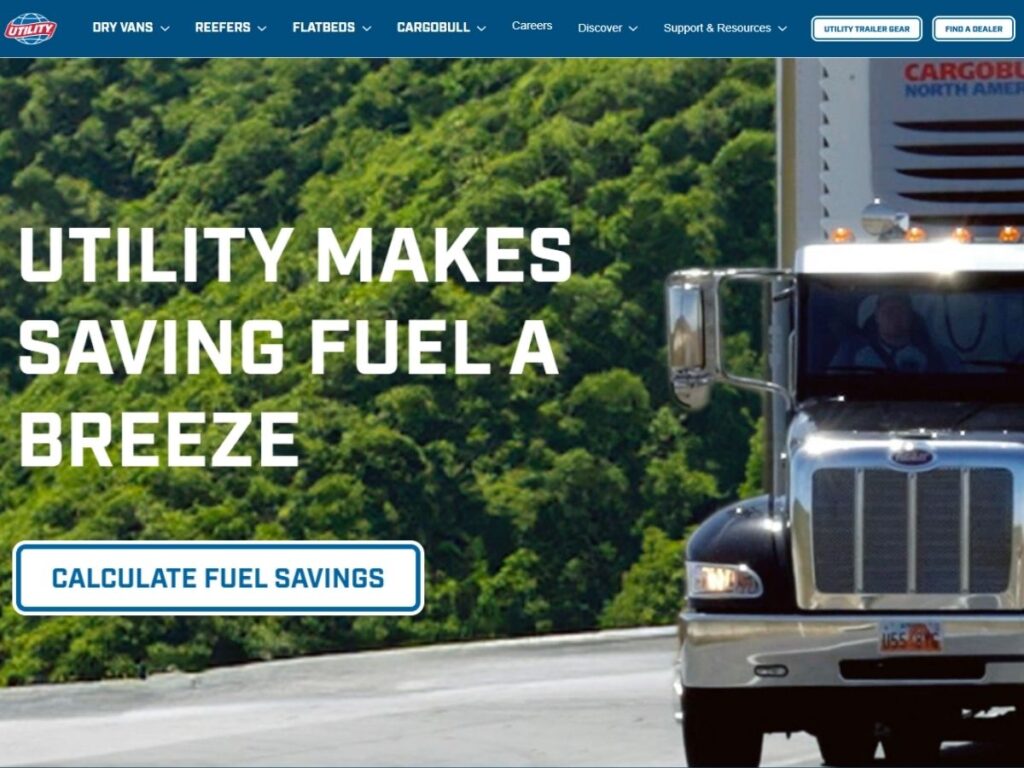
3. Rhinotrail
The first time I saw a Rhinotrail flatbed in action was at a construction site in Kenya. The trailer was loaded heavy, roads were far from smooth, but it kept going—no sagging, no twist, no fuss. That stuck with me.
Rhinotrail is based in Liangshan County, Shandong, China—a known hub for semi-trailer production. With over 12 years of experience, Rhinotrail focuses on custom-built semi-trailers for industries like construction, mining, agriculture, logistics, and energy. The name itself is a blend of “Rhino” and “trailer,” which speaks to their focus: strength, reliability, and stability in rugged environments.
Unlike many larger company, Rhinotrail isn’t chasing mass production. They specialize in tailor-made solutions that fit local regulations and working conditions. That makes them a practical choice for operators in regions where road conditions and transport laws vary.
Product Range
Rhinotrail offers a full spectrum of semi-trailers built for industrial use:
- Flatbed Trailers: Tri axle, 20/40/45/53 ft, custom sizes for container or cargo
- Container Trailers: Skeletal, side wall, fence, livestock, and logging trailers
- Low Bed Trailers: Including removable gooseneck, stretch, hydraulic modular
- Dump Trailers: Rear, side, and crawler dump models for construction/mining
- Tanker Trailers: Fuel and cement tankers
- Refrigerated Semi-Trailers: For cold chain logistics
- Utility Trailers: Platform trucks, garbage trucks, cleaning vehicles
Technological Innovations
Rhinotrail focuses on smart build quality and fit-for-purpose tech rather than flashy add-ons:
- Q345B/Q460C Steel Frames: Known for high strength and long life under load
- Anti-Corrosion Coatings: Extends trailer lifespan, especially in coastal and humid areas
- Modular Design Features: Allows easier servicing and spare part replacement
- Load Testing at 150% Capacity: Confirms trailer strength before delivery
- 3D Custom Simulation Tools: Helps visualize and confirm trailer specs before production
Contact Information
- Address: Quanpu Town Industrial Park, Liangshan County, Jining City, Shandong Province, China
- Email: [email protected]
- Phone: +86 12312341234
Key Takeaways
Rhinotrail gives you more than just a trailer. You’re getting a partner that adapts to your working reality—whether you’re hauling across African gravel, Southeast Asian jungle roads, or tight urban areas. Their flatbeds and container chassis are reliable, and their price-to-performance ratio is among the best for growing fleets.
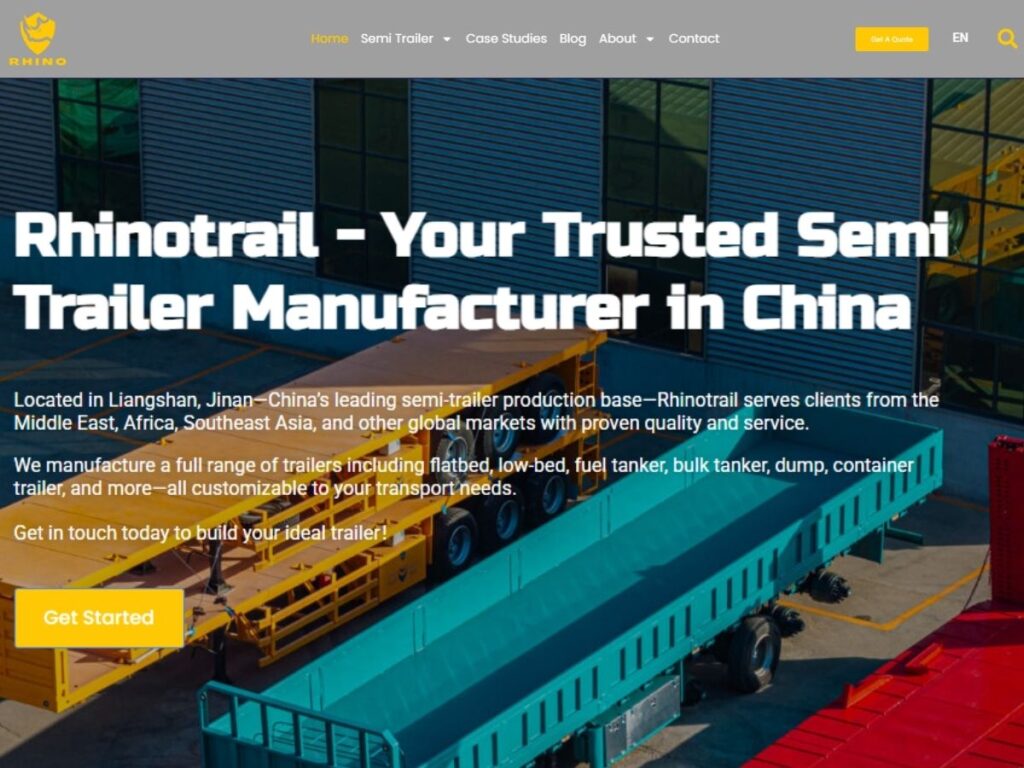
4. Great Dane
When I got into hauling, I heard the name Great Dane more times than I could count. It was always mentioned with respect. That made me curious.
The company has been around since 1900, starting in Savannah, Georgia, as the Savannah Blowpipe Company. Over the years, it transformed into one of the largest trailer manufacturers in North America. Now headquartered in Chicago, Great Dane is a major player in dry vans, reefers, and flatbeds.
What I like most is their commitment to quality and safety. I’ve personally worked with their trailers on long runs—and I’ve felt the difference. They don’t rattle apart like some cheaper builds do after a few years on the road.
Product Range
Great Dane’s lineup covers the essentials and then some:
- Dry Freight Vans: For goods that don’t need refrigeration
- Refrigerated Trailers (Reefers): Keep perishable cargo cold and stable
- Flatbed Trailers: For bulky or irregular loads
- Platform Trailers: Handle heavier-duty hauls with reinforced decks
Technological Innovations
They’ve added a lot of tech to help fleets run better:
- FleetPulse Telematics System: Tracks location, tire pressure, brake health, and more
- Corrosion-Resistant Coatings: Helps the trailer last longer, especially in winter climates
- RIG30 Rear Guards: Added safety in case of rear-end collisions
- Advanced Refrigeration Tech: Keeps tighter temp control with better insulation
Contact Information
- Address: 222 N. LaSalle Street, Suite 920, Chicago, IL 60601, USA
- Phone: +1 (912) 644-2100
Key Takeaways
Great Dane is a great match for fleet owners who care about long-term value and smart trailer tech. Their trailers hold up well over time, and tools like FleetPulse help you stay ahead of problems before they get expensive.
That said, availability can be hit or miss. At one point, I had to wait longer than expected to get parts for a trailer repair—and I’m not the only one who’s run into that. If you’re in a remote area or working under tight deadlines, this might be something to plan around.
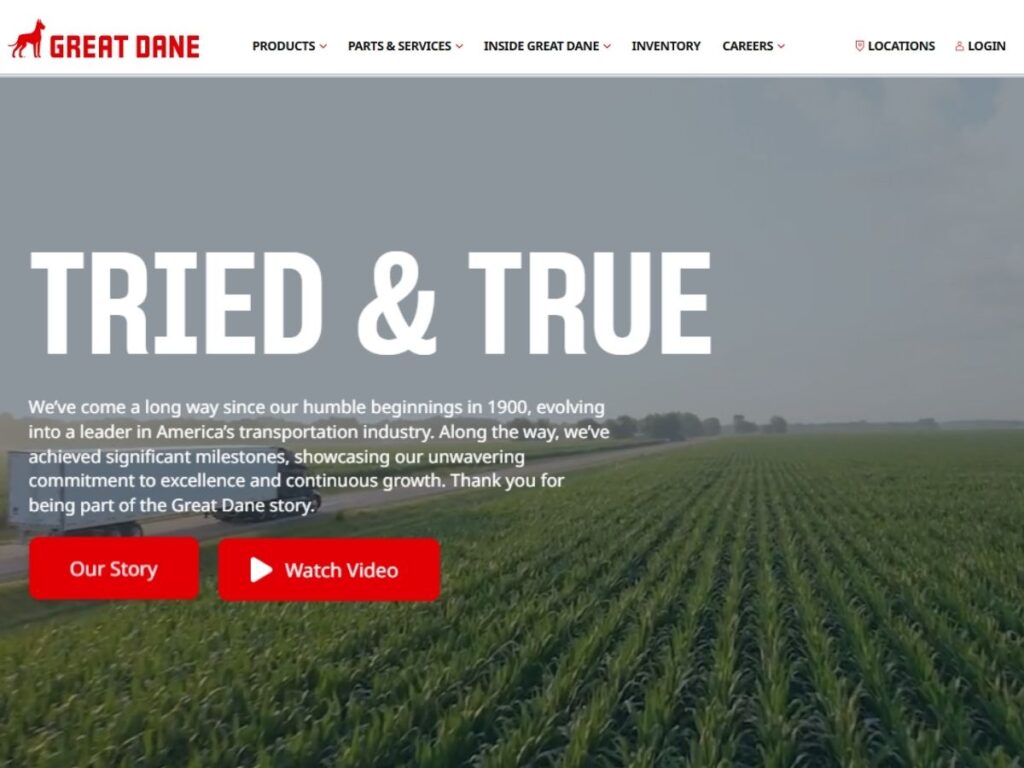
5. Wabash National
Wabash National was founded in 1985 in Lafayette, Indiana. Compared to older suppliers in the market, they’re a younger company—but don’t let that fool you. They’ve made big strides through constant innovation. Today, they’re a leading manufacturer of semi-trailers and advanced composite materials, known for pushing the industry forward with bold ideas and smart design.
If you care about cutting fuel costs, reducing emissions, or just want a trailer that can handle tough miles—Wabash probably has something for you.
Product Range
Wabash offers a wide range of trailers built for strength and efficiency:
- Dry Freight Vans: For hauling general cargo in secure, enclosed conditions
- Refrigerated Trailers (Reefers): Keep perishables at a stable temperature, great for food or pharma
- Combo Flatbed Trailers: Use steel in high-stress spots and aluminum elsewhere for a strong but lighter build
- Aluminum Flatbeds: Lighter in weight, better for fuel savings on heavy hauls
Technological Innovations
Wabash doesn’t stick to old ways—they invest in smart upgrades:
- DuraPlate® Wall Technology: Composite wall panels that resist impact and last longer than traditional materials
- Zero-Emission Reefers: Solar-powered reefers help cut fuel use and emissions
- ThermoGuard® Linings: Keeps insulation intact over time, maintaining cold temps more consistently
- Telematics Integration: Gives you trailer health data in real time so you can plan maintenance before a breakdown
Contact Information
- Address: 3900 McCarty Ln, Lafayette, IN 47905, USA
- Phone: +1 (765) 771-5300
Key Takeaways
Wabash National builds trailers with one thing in mind—lasting through real-world work. Their mix of composite materials, smart insulation, and solar reefer tech puts them ahead in innovation.
The downside? Their advanced features come at a cost. You might pay more upfront than you would for a basic steel trailer. Plus, repairs on composite panels may require specific materials or service locations.
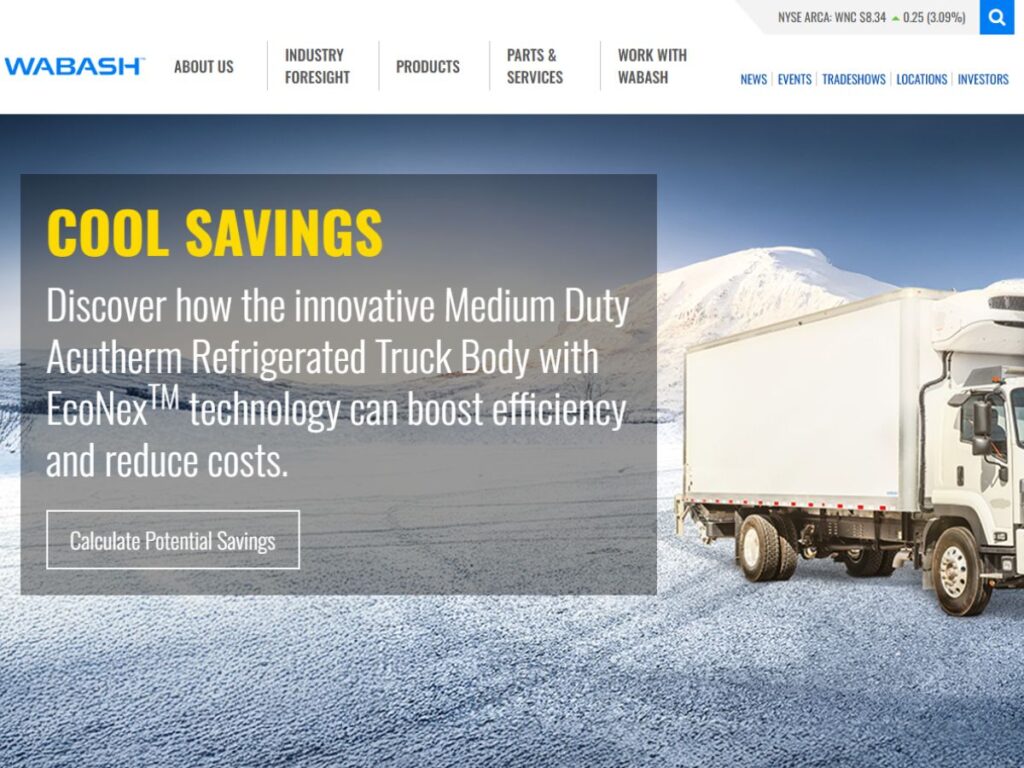
6. Fontaine Trailer
In the logistics business, trailer weight can quietly eat away at your bottom line. Years ago, one of my clients switched their fleet over to Fontaine’s lightweight models—and the drop in fuel costs spoke for itself within months. That stuck with me.
Fontaine Trailer Company was established in 1940 in Haleyville, Alabama, and has since grown into one of the largest manufacturers of platform trailers in the U.S. They focus heavily on engineering lighter, stronger trailers that hold up under pressure. Fontaine is known for innovation and long-haul durability, especially in heavy construction and commercial transport markets.
They’re not just in the business of building trailers. They’re in the business of saving time and fuel—and I’ve seen that firsthand.
Product Range
Fontaine’s trailer lineup fits a wide range of industries:
- Revolution All-Aluminum Trailers: Lightweight and corrosion-resistant for high payload efficiency
- Infinity Combo Trailers: A steel-aluminum mix for balance between cost and performance
- Velocity Steel Trailers: Heavier builds for extreme-duty hauling
- Dropdeck Trailers: Lower decks for transporting taller equipment
- Lowbed Trailers: Heavy-haul units for machines or oversized loads
Technological Innovations
Fontaine is pushing design boundaries with several innovations:
- RASR Siderails: Routed aluminum rails 12x stronger than traditional, with better load tie-down flexibility
- Stir-Lite™ Technology: Reduces weight without sacrificing strength—used in the Revolution line
- Modular Build Style: Makes repairs easier and faster in the field
- Corrosion-Resistant Coatings: Extends trailer life in harsh weather or salted roads
Contact Information
- Address: 430 Letson Road, Haleyville, AL 35565, USA
- Phone: 800-821-6535 or 205-486-5251
- Email: [email protected] | [email protected]
Key Takeaways
Fontaine has carved out a reputation as a leader in lightweight platform trailers. Their Revolution and Infinity series are ideal for businesses looking to cut fuel use without sacrificing strength. I’ve recommended them to clients hauling cross-country because you get better efficiency without worrying about structure fatigue halfway through the job.
But here’s what you should know: if your operation is more local and weight limits aren’t your top concern, Fontaine’s premium builds might be more than you actually need. Their innovations shine best over long distances where every pound matters. If that’s not your route, a more standard steel trailer might be a better fit for your dollar.
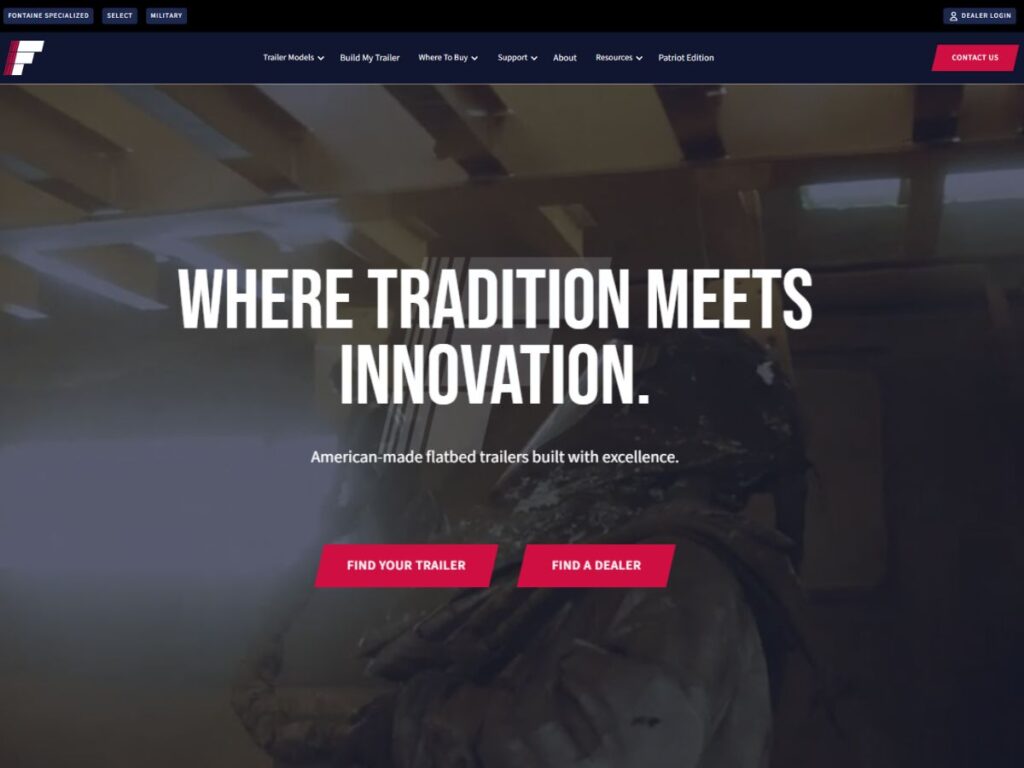
7. Doepker Industries
During a particularly challenging haul through the Canadian Prairies, I noticed a fellow trucker effortlessly managing his load with a Doepker trailer. His ease piqued my interest, leading me to delve deeper into the company.
Doepker Industries, established in 1948 in Annaheim, Saskatchewan, began as a small family-run operation. Over the decades, they’ve grown into a leading Canadian manufacturer of commercial trailers, renowned for their commitment to quality and innovation. Their deep roots in the Canadian landscape have given them a unique understanding of the challenges faced by haulers in diverse terrains.
Product Range
Doepker offers a diverse lineup tailored to various hauling needs:
- Flatbed Trailers: Designed for versatility, accommodating a wide range of cargo types.
- Super B-Train Trailers: Ideal for bulk haulage, especially in the agricultural sector.
- Grain Trailers: Specialized for efficient transportation of grains and similar commodities.
- Logging Trailers: Engineered to withstand the rigors of transporting heavy timber loads.
- Oilfield Trailers: Built to support the demanding needs of the energy sector.
Technological Innovations
Doepker integrates several advanced features to enhance trailer performance:
- Flex Sidewall Technology: Offers increased durability and resistance to side impacts.
- Lightweight Designs: Focuses on maximizing payload without compromising structural integrity.
- Corrosion-Resistant Materials: Utilizes advanced coatings and materials to extend trailer lifespan, especially in harsh weather conditions.
- Enhanced Aerodynamics: Design elements aimed at reducing drag and improving fuel efficiency.
Contact Information
For more details or inquiries:
- Address: Highway 5 West, Annaheim, SK S0K 0G0, Canada
- Phone: +1 (306) 598-2171
Key Takeaways
Doepker Industries has carved a niche in producing trailers that resonate with the practical needs of haulers, especially in challenging terrains. Their emphasis on lightweight yet durable designs speaks to their understanding of the industry’s demands.
The only thing I’ve seen trip people up is resale. These trailers are built to last, which is great if you’re keeping them for the long haul—but it also means they don’t move quite as fast on the used market unless you’re in the right region.
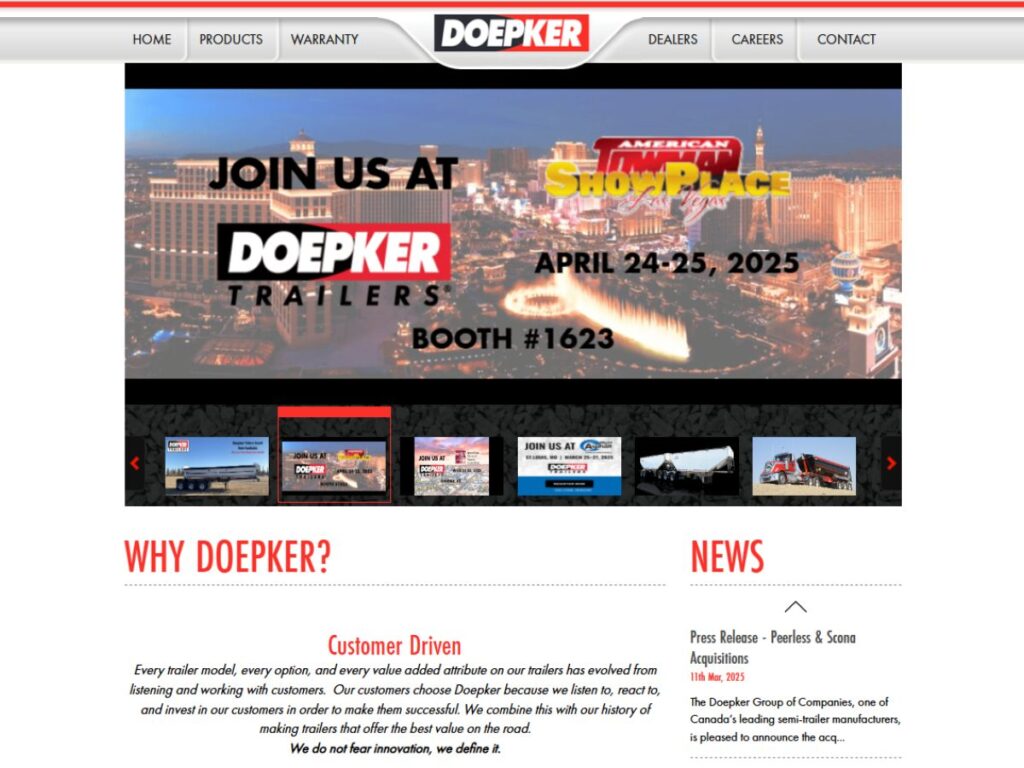
8. Stoughton Trailers
Established in 1961 by Don Wahlin in Stoughton, Wisconsin, Stoughton Trailers has grown from a modest family-owned business into one of North America’s prominent trailer manufacturers. With over six decades in the industry, they’ve built a reputation for producing dependable semi-truck trailers tailored for over-the-road trucking, agriculture, and specialty transportation.
Product Range
Stoughton offers a diverse lineup to cater to various hauling requirements:
- Dry Van Trailers: Designed for the secure transport of non-perishable goods.
- Grain Trailers: Specialized for efficient grain transportation, featuring durable construction to withstand heavy loads.
- Chassis: Engineered to transport intermodal containers, ensuring compatibility and strength.Craft.co
- Refrigerated Trailers: Built to maintain temperature-sensitive cargo, ensuring product integrity during transit.
Technological Innovations
Stoughton integrates several advanced features to enhance trailer functionality:
- Auto Connect™ System: In collaboration with Electrans Technologies, this system automates the connection of air, electrical, and communication lines between the truck and trailer in just seven seconds, reducing manual labor and potential errors.
- Robotic Welding: Implemented in their chassis production lines to ensure precision and consistency, addressing labor challenges and enhancing product quality.
Contact Information
For more details or inquiries:
- Address: 416 S. Academy St., Stoughton, WI 53589
- Phone: +1 (608) 873-2500
- Email: [email protected]
Key Takeaways
Stoughton Trailers has carved a niche in delivering durable and innovative transportation solutions. Their commitment to integrating technologies like the Auto Connect™ system showcases a forward-thinking approach to modern hauling challenges. From my observations, drivers appreciate the balance Stoughton strikes between traditional craftsmanship and modern advancements.
But here’s what you need to know, their after-sales support leaves room for improvement. I had a small warranty issue once—nothing major—but getting through to someone who could resolve it quickly took more time than it should have.
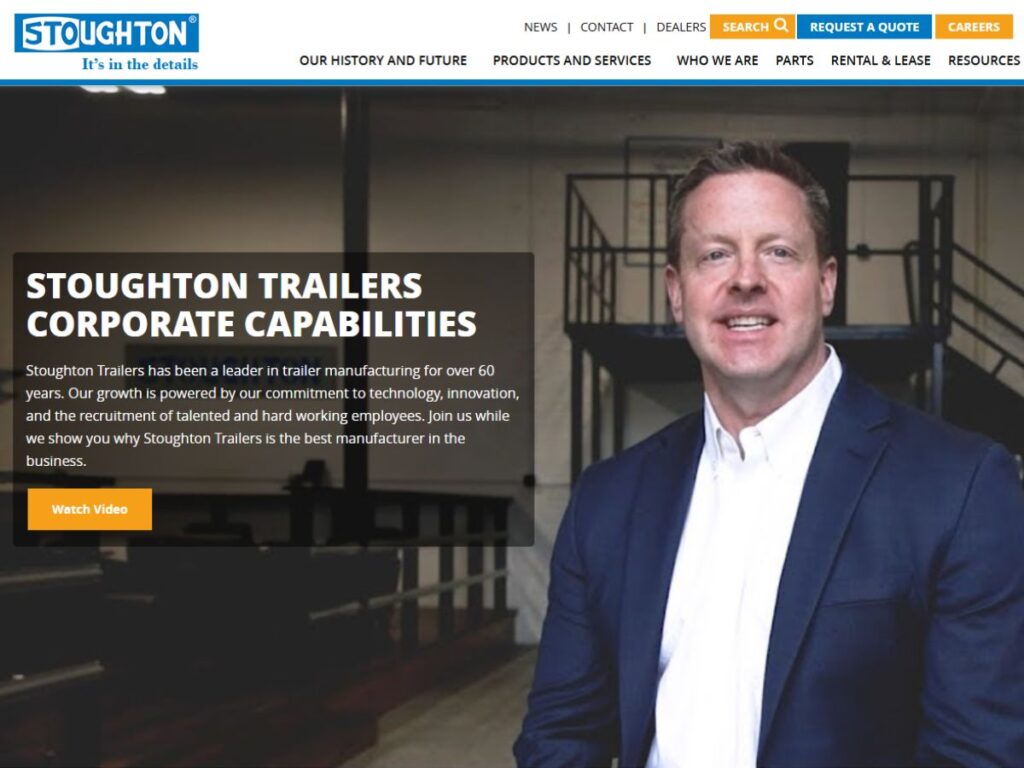
Conclusion
Choosing the right equipment trailer doesn’t have to be confusing.
This article gave you everything I wish I knew back when I started. The strong players. The quiet giants. The ones who show up where it matters.
And if you want something that’s truly built around your haul, Rhinotrail is ready to put in that work.
Don’t wait until something breaks.
Contact us today and let’s talk specs, road conditions, and timelines!

